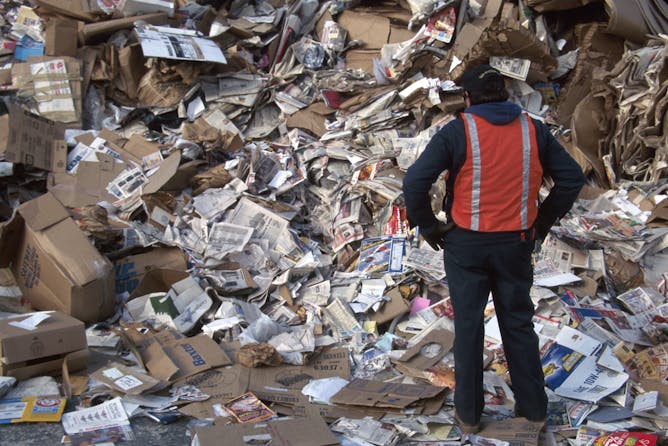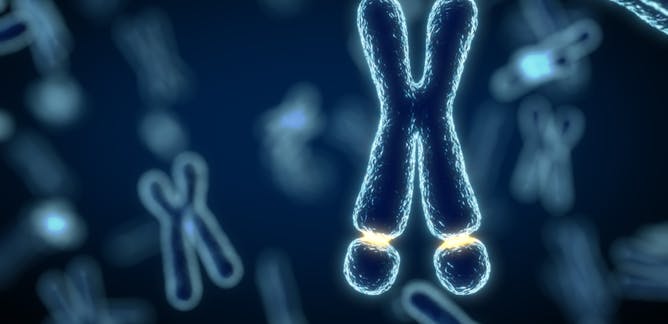|
|
|
|
At one level, recycling is a great success – consumers no longer toss paper and aluminum cans into the trash as we did when I was a kid. But a group of researchers at the University of Virginia and Indiana University conducted a series of surveys that showed how people often default to recycling and overlook a more effective waste management strategy: reducing the generation of waste in the first place. They write about some ways to tilt the balance toward the
“reduce” end of the long-held “reduce, reuse, recycle” waste management hierarchy.
Once again this week, the searing heat in many parts of the U.S. and the world is dominating headlines, including recent ones saying the Earth has reached its hottest point in 100,000 years. Paleoclimatologist Darrell Kaufman explains how scientists like him can recreate the temperatures of the past by examining sediment cores at the bottom of lakes and oceans, among other natural sources. Regardless of whether the planet has reached a particular temperature high point, Kaufman writes that “scientists concluded a few years ago that Earth had entered a new climate state not seen in more than 100,000 years.”
It can be very pleasant to smell lavender or other natural oils, but whether aromatherapy should be prescribed for better health is another question entirely. And here, the scientific data does not provide the evidence needed for clinical usage, writes Marian Reven, a professor of clinical education at West Virginia University. She provides a picture of how some essential oils are used, the risks people should be aware of, and efforts to conduct high-quality
research.
Also in this week’s science news:
If there’s a subject you’d like our team of science editors to investigate, please reply to this email.
|

|
Martin LaMonica
Director of Editorial Projects and Newsletters
|
|

A worker sorts cardboard at a recycling center in Newark, N.J.
Jeff Greenberg/Universal Images Group via Getty Images
Michaela Barnett, University of Virginia; Leidy Klotz, University of Virginia; Patrick I. Hancock, University of Virginia; Shahzeen Attari, Indiana University
New research shows that Americans may have absorbed public messaging about the importance of recycling too well.
|

Recent heat waves underscore Earth’s new climate state.
Sean Gladwell via Getty Images
Darrell Kaufman, Northern Arizona University
Long before thermometers, nature left its own temperature records. A climate scientist explains how ongoing global warming compares with ancient temperatures.
|

Public acceptance of aromatherapy is high, but that doesn’t mean it works.
Huizeng Hu/Moment via Getty Images
Marian Reven, West Virginia University
As the evidence for aromatherapy trickles in, be wary of marketing ploys and possible risks posed by some of these products.
|
|
|

Anne-Katherine Burns, University of California, Irvine
The way particles interacted while the universe was forming seconds after the Big Bang could explain why the universe exists the way it does – a physicist explains matter-antimatter asymmetry.
| |

Jane Manfredi, Michigan State University
Horses and humans share biological similarities that lead them to suffer from similar endocrine and orthopedic diseases. A number of treatments that work for one species often work for the other.
|

Riley Post, University of Iowa
An engineer who managed dams for years explains the tradeoffs operators make as they decide when to release water and how much to stay safe.
| |

Joel Richter, UMass Chan Medical School; Sneha Shah, UMass Chan Medical School
Fragile X syndrome is the most common inherited form of intellectual disability. Using short bits of DNA to fix improperly transcribed genes may one day be a potential treatment option.
|
|
|
|
|
-
Stefan Lovgren, University of Nevada, Reno
Freshwater megafish numbers have fallen by 94%, according to one study.
-
Stephen G. Alexander, Miami University
Both Stephen Alexander’s elementary teachers and televised NASA missions throughout the ‘60s influenced his journey into science. He recounts NASA’s legacy, 65 years after the agency’s inception.
-
Deborah Carr, Boston University; Giacomo Falchetta, International Institute for Applied Systems Analysis (IIASA); Ian Sue Wing, Boston University
Health and climate change researchers explain the risks and why older adults, even those in northern states, need to pay attention.
-
Hortensia Soto, Colorado State University
Math is more than memorizing times tables and doing homework problems. It is woven into more aspects of your life than you might think.
|
|
|
|
|
| | |
| | |
| |
| |
| |
|
|
|